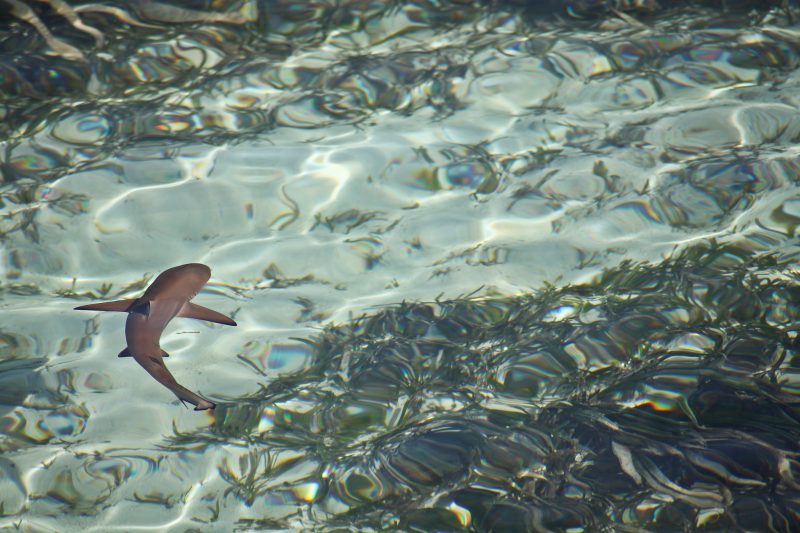Demand for shark fin is in decline, particularly in China, but shark fishing is still rampant in Indonesia. A lack of regulation to protect sharks persists.
Decreased demand for shark fins in China has failed to curb shark fishing in Indonesia, one of the largest exporters of shark fins in the world. The demand for other shark products is still high, according to conservation experts. Indonesia is home to the world’s most diverse population of sharks, boasting 118 different species, and the archipelago is the top shark-fishing nation in the world.
Between 2000 and 2011, Indonesia caught an average of 109,000 metric tonnes of shark species (not just the fins) every year, followed by India at 74,000 metric tonnes. Together, the two countries’ shark haul still comprises about 20 percent of the global catch.
Arifsyah M. Nasution, an oceans campaigner at Greenpeace Indonesia, says that on paper the trade of shark fins in Indonesia has been hit hard by the decreasing demand from China. But that’s only true for trade happening via legal channels.
“Legally, there has been a decrease due to the policy from the Chinese government as well as active campaigning informing [the public about] the negative impact [of shark finning],” says Nasution. “It’s still massive because of the weak regulations in Indonesia as well as the illegal shark fin shipping process, which goes into black markets. That’s what we need to pay attention to.”
According to Indonesia’s official statistics agency, the country exported 248.7 tonnes of shark fins in 2014. That’s 51 percent less than the 514.3 tonnes it exported in 2012. However, the shark fin trading activity that goes unrecorded in Indonesia is still very high, Nasution adds, with 13 percent of all sharks killed each year still coming from Indonesia.
Local consumption of sharks – not only their fins but also their meat – is still strong. Additionally, Indonesia’s shark-meat exports reached 2,280 tonnes in 2014, up nearly 30 percent from 2012.
“There are various uses of sharks besides culinary [purposes], such as for medicine. Moreover, people can sell not only their fins but also their meat,” says Nasution. “Domestically, consumption of shark meat is high, seeing how they can be used to make meatballs and so on.”
Thriftier than steak?
Nasution adds that the price of shark meat can sometimes be lower than that of beef.
Indonesia lacks the necessary regulation and enforcement to protect sharks in the archipelago. “The regulation in Indonesia is still weak because there is no national ban,” he says. “That said, the government has warned against shark fishing.”
Increased shark fishing in Indonesia puts several species at risk of extinction. Conservation group Save Sharks Indonesia says uncontrolled shark fishing goes on to affect entire marine ecosystems. Most sharks are apex predators, which means they control the populations of their prey animals. If there are no sharks, prey populations explode disproportionately. These prey animals will in turn consume more herbivore fish.
“They will devour fish which function to clean coral reefs of algae. With no one cleaning them, the health of coral reefs is under threat and thus the situation results in a phenomenon called coral bleaching. If this goes on for three months, the coral reefs will die,” Nasution tells Indonesia Expat.
Save Sharks Indonesia is an organization that targets consumers of seafood products in its conservation campaigns.
“It’s not only the government as the regulation maker and the fishermen as the product suppliers that have become our [campaign] targets. Shark fin consumers have also become our targets because all this time, their roles as triggers for the overfishing of sharks have received less attention,” explains Save Sharks Indonesia campaign director Riyanni Djangkaru.
Nasution agrees the focus of Djangkaru’s campaign is right on the money. However, he says, “If there is a total ban on shark fishing, it will disturb the livelihoods of fishermen in Indonesia because they are already heavily dependent on sharks.” That said, it’s conceivable that tighter regulation from the Indonesian government is the only way forward.
China’s love for shark fin soup tapers off
Shark fin soup – a goopy broth that can easily cost over US$100 a bowl and is believed by some to have medicinal properties – is starting to lose its appeal among China’s youth, following reports of restaurants’ rampant use of fake, sometimes toxic, shark fins.
Shark fin stands out as a symbol of wealth in the People’s Republic and other parts of Asia. China is the world’s largest market for shark fin due to its people’s rising wealth and desire for luxury goods.
The trade in shark fins has led to the dramatic decline of some shark populations, up to 98 percent in the last 15 years. An estimated 100 million sharks are killed each year. Fishermen harvest 73 million of those for their fins, which they cut off before the shark is left to die.
Celebrities like former basketball star Yao Ming, a popular figure in China, have decided to lend a hand to the cause. He became the face of a campaign launched by WildAid, a US-based organization focusing on reducing demand for wildlife products like shark fin.
Touting the slogan, ‘When the buying stops, the killing can too’, WildAid boldly said the campaign cut the number of sharks killed for their fins by 50 percent.
According to data collected by WildAid, sales of shark fin in Guangzhou, considered the centre of China’s shark fin trade, have dropped by 82 percent.
A government crackdown on the soup also helped catalyse the drop. Shark fin soup is now banned at official banquets in mainland China and Hong Kong. Pressure from conservationists has also influenced big businesses. A number of large hotel chains have stopped serving shark fin soup and more than 20 airlines have agreed not to transport it.
“In recent years, there has been a global decline in demand for shark fins,” confirms Vardhan Patankar, a marine biologist and researcher in the Andaman Islands.
Still, much of the damage has already been done, and the recent tapering in global exports of shark fin products may have come too late.
Populations of the 14 shark species whose fins are most used in the Chinese dish have declined by anywhere between 40 percent and 99 percent and are currently classified as threatened or near-threatened species, according to WildAid.




